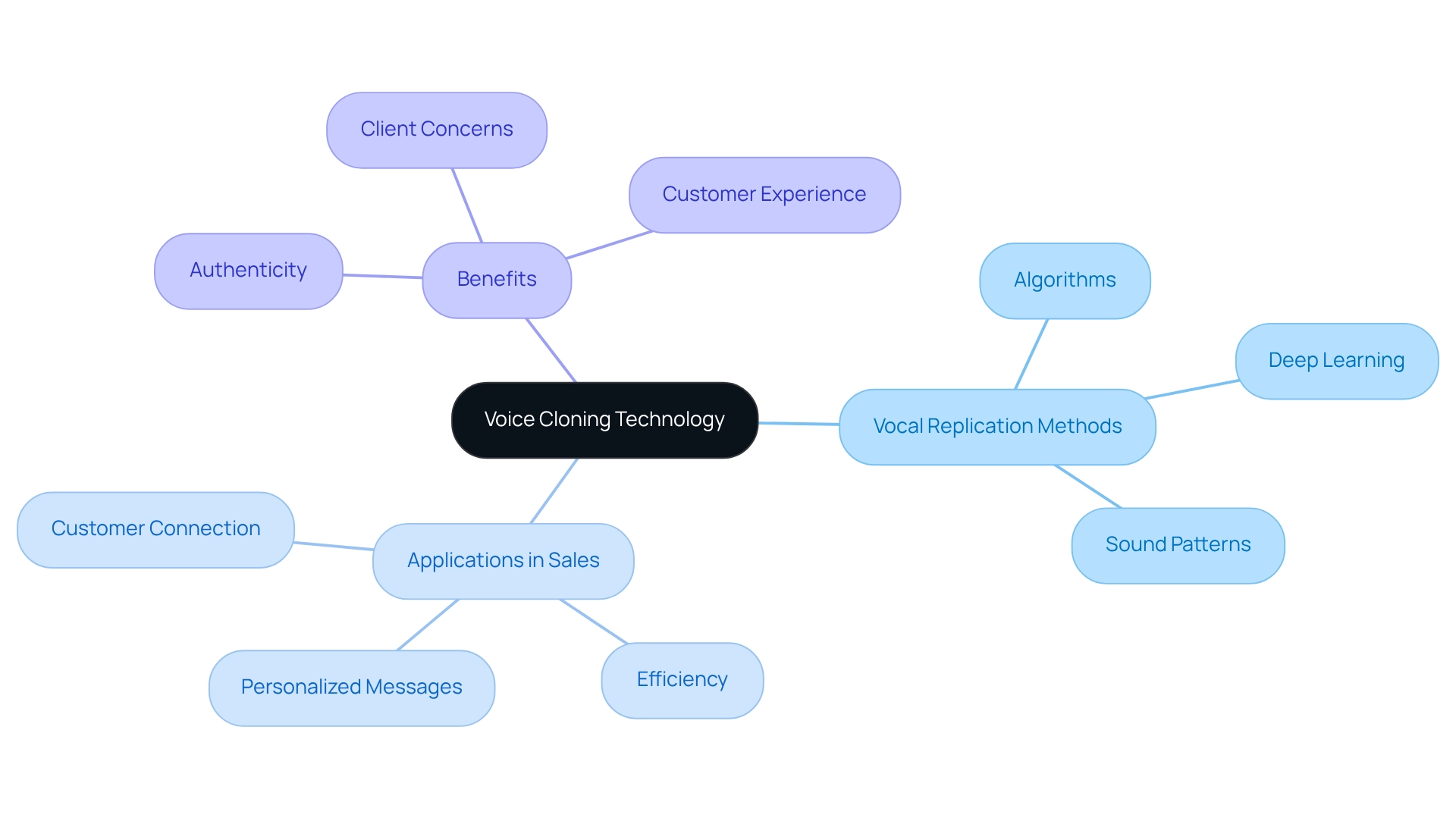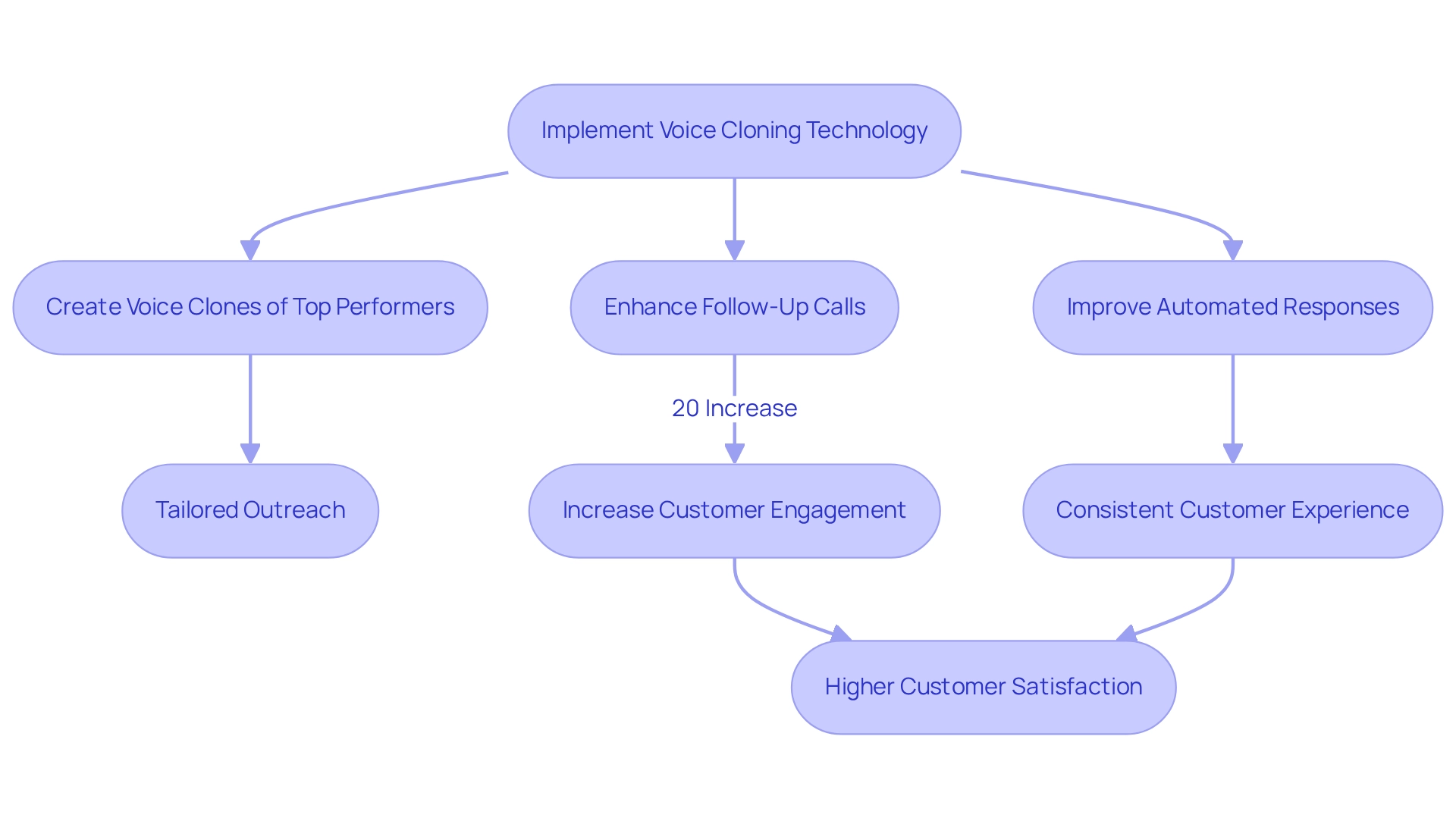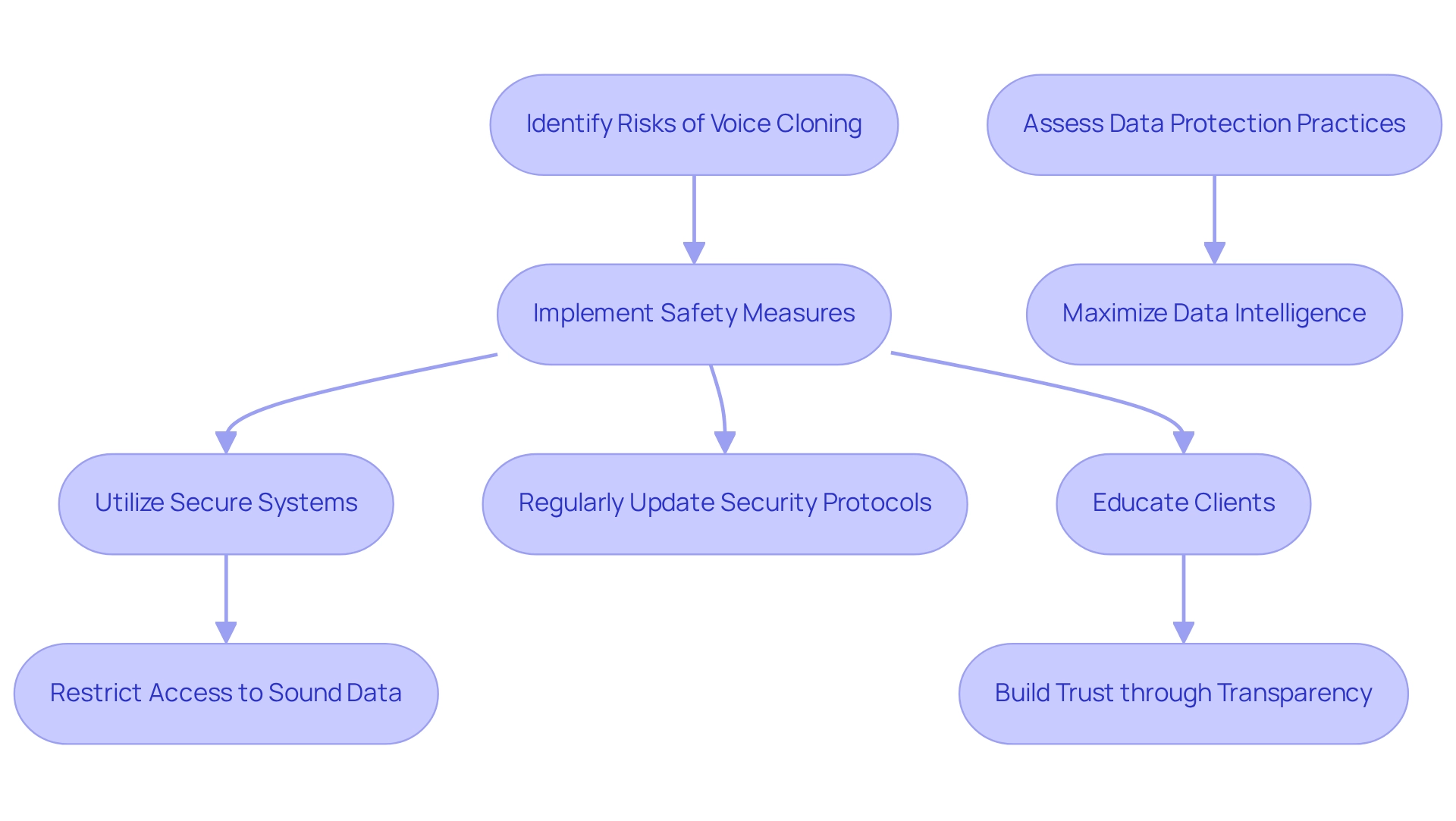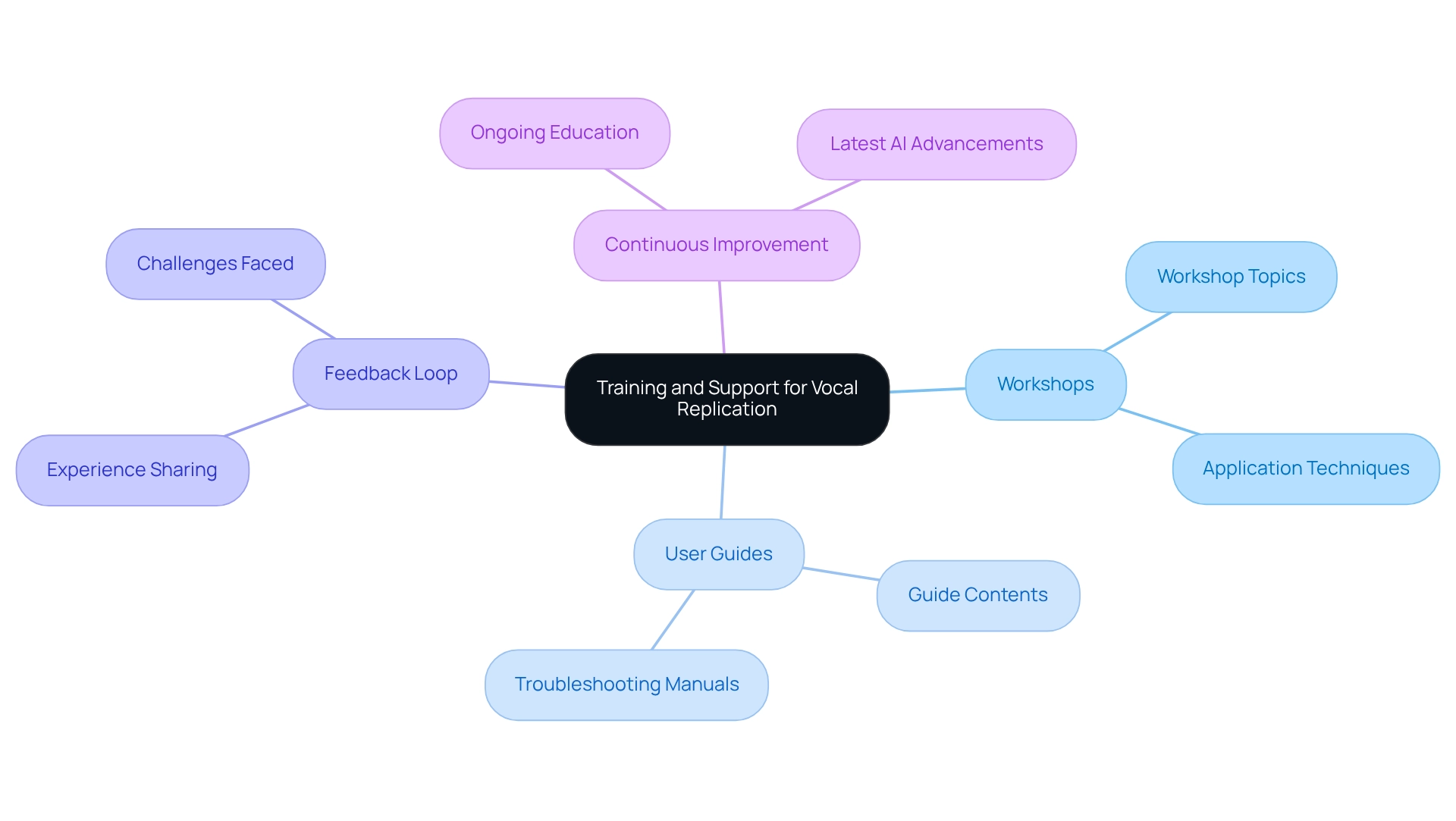
4 Strategies to Leverage Voice Clone for Sales Success
GeneralKey Highlights:
- Voice cloning technology uses deep learning to replicate a person’s speech, enhancing customer interactions.
- Sales teams can leverage voice clones for personalised outreach, improving efficiency and customer connexion.
- Tailored communication through voice cloning can increase customer engagement by 20%.
- Automated responses using voice clones ensure consistent and engaging customer experiences.
- Robust safety measures are essential to prevent misuse of voice cloning technology for fraud or misinformation.
- Transparency about AI-generated communications builds trust with clients.
- Organisations must provide training and support for sales staff to effectively utilise voice cloning technology.
Introduction
In a landscape where personalisation is paramount for successful customer interactions, voice cloning technology stands out as a revolutionary asset for sales teams. By leveraging advanced algorithms and deep learning, this cutting-edge technology replicates individual voices, empowering sales representatives to craft personalised communications that truly resonate with clients.
As organisations strive to boost engagement and efficiency, grasping the intricacies of voice cloning becomes crucial. However, despite the compelling advantages, the potential risks linked to misuse must not be disregarded.
This article explores the transformative potential of voice cloning, examining its applications in sales, the significance of implementing safety measures, and the necessity for thorough training to ensure its effective utilisation.
Understand Voice Cloning Technology
Vocal replication methods leverage advanced algorithms to effectively imitate a person’s speech, generating a voice clone that closely aligns with the original speaker. By utilising deep learning and neural networks, this technology meticulously examines sound patterns, intonations, and speech subtleties, establishing itself as an invaluable resource for sales teams.
Understanding these technical components is crucial, as it underscores the potential of vocal replication to enhance customer interactions, customise communication, and automate responses efficiently. For example, sales agents can use voice clones to convey personalised messages to clients, preserving a human touch while optimising routine communications. This capability not only boosts efficiency but also cultivates a sense of connexion with customers.
Furthermore, a solid grasp of audio replication methods equips sales teams to address any concerns clients may have regarding the authenticity and reliability of AI-generated communications, ultimately elevating the overall customer experience.

Leverage Voice Cloning for Enhanced Communication
Sales teams can significantly enhance their communication strategies through the innovative use of voice clone technology. By creating voice clones of top-performing representatives, teams can deliver customised outreach that resonates with clients, facilitating personalised messages without the need for repetitive recordings. This method not only streamlines communication but also cultivates a sense of familiarity and trust.
Vocal imitation is particularly effective in follow-up calls, where a recognisable tone can alleviate clients’ concerns and strengthen brand loyalty. Research indicates that tailored outreach can yield a 20% increase in customer engagement, underscoring the effectiveness of this technology in driving commercial success.
Moreover, audio replication can improve automated responses for frequently asked questions, ensuring a consistent and engaging customer experience. By implementing these strategies, teams not only save valuable time but also enhance the quality of client interactions, ultimately leading to superior outcomes. Case studies reveal that organisations utilising voice clone technology for follow-ups report higher customer satisfaction levels, highlighting the potential of this innovation to transform communication in commerce.

Implement Safety Measures Against Voice Cloning Risks
Voice clone technology offers significant advantages, but it also carries inherent risks, particularly regarding potential misuse for fraud or misinformation. To combat these threats, marketing teams must implement robust safety measures. Utilising secure systems for audio reproduction applications is essential, ensuring that access to sound data is restricted to authorised individuals only. Additionally, regular updates to security protocols are critical for staying ahead of emerging threats.
Educating clients about the authenticity of communications is another vital strategy for building trust. Transparency regarding the use of voice clone technology in communications is imperative; sales teams must clearly inform clients when they are interacting with AI-generated content. By prioritising security and ethical considerations, organisations can effectively harness the benefits of audio replication while minimising potential risks.
Statistics reveal a troubling trend in audio replication misuse, with instances of fraud markedly increasing in recent years. This underscores the necessity for organisations to adopt best practises for securing audio replication applications in commerce. Expert opinions stress that without appropriate governance and security measures, the risks associated with audio duplication can escalate, potentially leading to significant reputational damage and loss of customer confidence. By proactively addressing these challenges, companies can navigate the complexities of audio replication methods and enhance their marketing strategies.
As Jim Liddle, Chief Innovation Officer at Nasuni, asserts, organisations must maximise their data intelligence while adhering to privacy best practises. This involves posing critical questions about data accuracy, classification, and compliance, which are fundamental to pursuing AI initiatives safely. Furthermore, the recent Data Privacy Week serves as a timely reminder for organisations to assess their data protection practises, reinforcing the importance of robust governance measures to safeguard critical data. By integrating these insights and best practises, sales teams can more effectively protect their audio replication applications and mitigate associated risks.

Provide Training and Support for Effective Utilization
To enhance the advantages of vocal replication methods, organisations must prioritise thorough training and robust support for their sales staff. This approach begins with organising workshops focused on the efficient development and application of audio replicas, coupled with ongoing education about the latest advancements in artificial intelligence.
Providing essential materials, such as user guides and troubleshooting manuals, empowers representatives to utilise vocal replication confidently in their interactions. Furthermore, establishing a feedback loop allows team members to share their experiences and challenges, fostering a culture of continuous improvement.
By emphasising training and support, organisations can equip their sales teams to fully leverage the capabilities of voice clone technology, ultimately enhancing engagement and driving sales success.

Conclusion
Voice cloning technology presents a transformative opportunity for sales teams, enabling personalised communication that significantly enhances customer interactions. By comprehensively understanding the underlying algorithms and capabilities of this technology, organisations can effectively leverage voice clones to streamline outreach and cultivate deeper connexions with clients. The ability to craft tailored messages not only boosts efficiency but also fosters trust and familiarity, resulting in increased customer engagement and satisfaction.
Nevertheless, the compelling advantages of voice cloning come with inherent risks that must not be overlooked. Implementing robust safety measures is imperative to protect against potential misuse, including fraud and misinformation. Organisations must prioritise security protocols and maintain transparency with clients regarding the use of AI-generated communications. This proactive approach will effectively mitigate risks and preserve the integrity of customer relationships.
Furthermore, training and support are crucial in maximising the effectiveness of voice cloning technology. By investing in comprehensive training programmes and providing ongoing resources, sales teams can harness the full potential of this innovation. Encouraging a culture of continuous improvement through feedback and shared experiences empowers representatives to navigate the complexities of voice cloning with confidence.
In conclusion, the successful integration of voice cloning technology in sales not only enhances communication but also necessitates a balanced approach that addresses safety and training. As organisations embrace this cutting-edge tool, they will unlock new opportunities for engagement and drive sales success, all while safeguarding their reputation and maintaining client trust.
Frequently Asked Questions
What is voice cloning technology?
Voice cloning technology uses advanced algorithms to imitate a person’s speech, creating a voice clone that closely resembles the original speaker.
How does voice cloning work?
It utilises deep learning and neural networks to analyse sound patterns, intonations, and speech subtleties, enabling the generation of a highly accurate vocal replication.
What are the benefits of voice cloning for sales teams?
Voice cloning enhances customer interactions, allows for customised communication, and automates responses, helping sales teams convey personalised messages while maintaining a human touch.
How does voice cloning improve efficiency in sales?
By enabling sales agents to use voice clones for routine communications, it boosts efficiency and fosters a sense of connexion with customers.
Why is it important for sales teams to understand audio replication methods?
A solid understanding of audio replication methods helps sales teams address client concerns about the authenticity and reliability of AI-generated communications, improving the overall customer experience.
Enjoyed this post? Share it with your network!
10 Best AI Sales Tools to Boost Your Team’s Performance

Discover the top 10 best AI sales tools to enhance team performance and drive revenue growth.
Mastering Test Call Numbers: A Step-by-Step Guide for Sales Directors

Elevate your communication with our guide on mastering test call numbers for sales success.
7 Ways Automated Outbound Calls Boost Sales Performance

Discover how automated outbound calls enhance sales performance and streamline communication.
